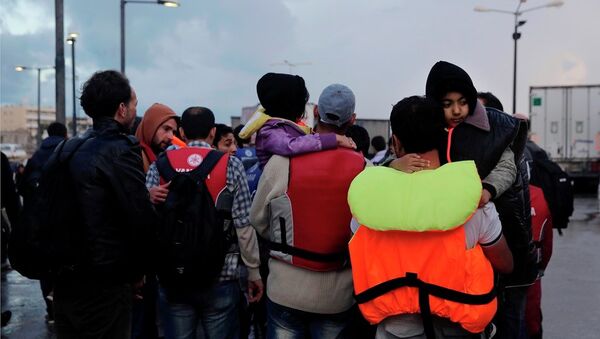The sheer numbers of people who died, never reaching European shores, is what eventually pushed the crisis to the top of the European Union agenda. However, EU leaders are still grappling with how to process the number of asylum seekers, with Italy, Greece and Malta still bearing the brunt of the problem.
1,000 refugees are arriving in #Greece everyday. Our partner @theIRC is en route to Lesvos now. pic.twitter.com/y33RCYFaTP
— UN Refugee Agency (@Refugees) July 14, 2015
Following a European Council meeting in June, leaders agreed to adopt a relocation scheme which would be agreed "by consensus", by all Member States.
The emergency two year scheme to relocate 40,000 migrants has been temporarily set up by the European Commission's help, with Italy and Greece — but on the condition that Italy and Greece take concrete steps to improve the screening of migrants on reception to their lands.
All Member States, except UK, will participate in relocation from IT and GR of 40.000 persons in need of protection. http://t.co/dm13qNhcR0
— Peter Díez (@diezpedrom) June 26, 2015
However, this according to the House of Lords EU Home Affairs Sub-Committee "appears to be a rejection of the Commission's mandatory model."
The Committee is calling on the British government to participate in the negotiation of the migrant relocation scheme.
Speaking elsewhere in the House of Lords, Lord Marlesford said:
"Forces for migration can never be removed. Conflict, chaos and persecution are the prime causes of the present migration crisis."
"It is simply impossible to process them in [the] EU in an organized way.
"Whether they are rescued or traveled illegally — it's impossible to remove them from Europe, there's nowhere for them to go. It's hard to believe Islamists and jihadists have not been entering Europe through the Mediterranean route."
Classified documents recently leaked by WikiLeaks have revealed that EU leaders are already aware of the potential risk that terrorist networks are infiltrating the smugglers boats and arriving on European shores.
"The threat to the force should be acknowledged, especially during activities such as boarding and when operating on land or in proximity to an unsecured coastline or during interaction with non-seaworthy vessels. The potential presence of hostile forces, extremists, or terrorists such as Da'esh [ISIL] should also be taken into consideration."
Europe: An urgent response is needed before the #Greek situation deteriorates further http://t.co/SApVWnZ3sA pic.twitter.com/jW1QIXl3UR
— UN Refugee Agency (@Refugees) July 13, 2015
Meanwhile, Rob Wainwright, head of Europol told an EU Home Affairs Sub Committee member that of most concern was "the possibility of a connection with terrorism.
"We've not seen the threat manifest itself in a significant way. We're very sensitive to signs that networks are infiltrated by D'aish (ISIL)."
Answering questions on the EU's action plan against migrant smuggling, Wainwright admitted that: "Criminal networks are exacerbating the problem — or directly responsible for the trade to encourage people to make the journey in the first place, and then exploit them on their arrival."
LIVE NOW: EU Cmttee, @LordsEUcom, questioning Director Wainwright about #EU Action Plan on #migrant smuggling: http://t.co/90e5LDGq4r
— Europol (@Europol_EU) July 15, 2015
"That's a large criminal infrastructure fundamental to the trade, and if we can take that away we can tackle this."
According to Wainwright, a smuggler can make a profit of almost $8772 (8000 euros) per migrant. "That's a lot of money."
Elsewhere, in the House of Lords, Baroness Kinnock of Holyhead said "EU member states have failed to agree on migrant resettlement, every day we hear stories about people who take mortal risks on land and sea.
"We are seeing such terrible human suffering on Europe's borders and Europe and the UK continue to renege on policies."
In response to the EU Action plan, Andrej Mehicic, senior external relations officer at UNHCR told the select committee that: "…more needs to be done on the proposal on the resettlement. We are urging member states to make commitments beyond the settlement quotas."
“Europe has a clear responsibility to help those seeking protection from war + persecution” http://t.co/Wne8MkA5yM pic.twitter.com/OYPlCIGLWZ
— UN Refugee Agency (@Refugees) July 7, 2015
And while EU leaders continue to grapple with quotas and members of the House of Lords debate the crisis, Greece has overtaken Italy as the gateway for migrants reaching Europe. New figures suggest 68,000 people recently arrived by boat to Greece via the Mediterranean — 500 more than in Italy.


